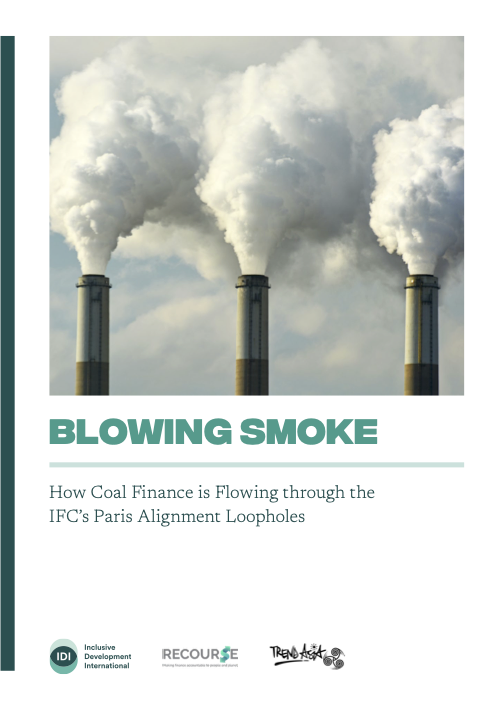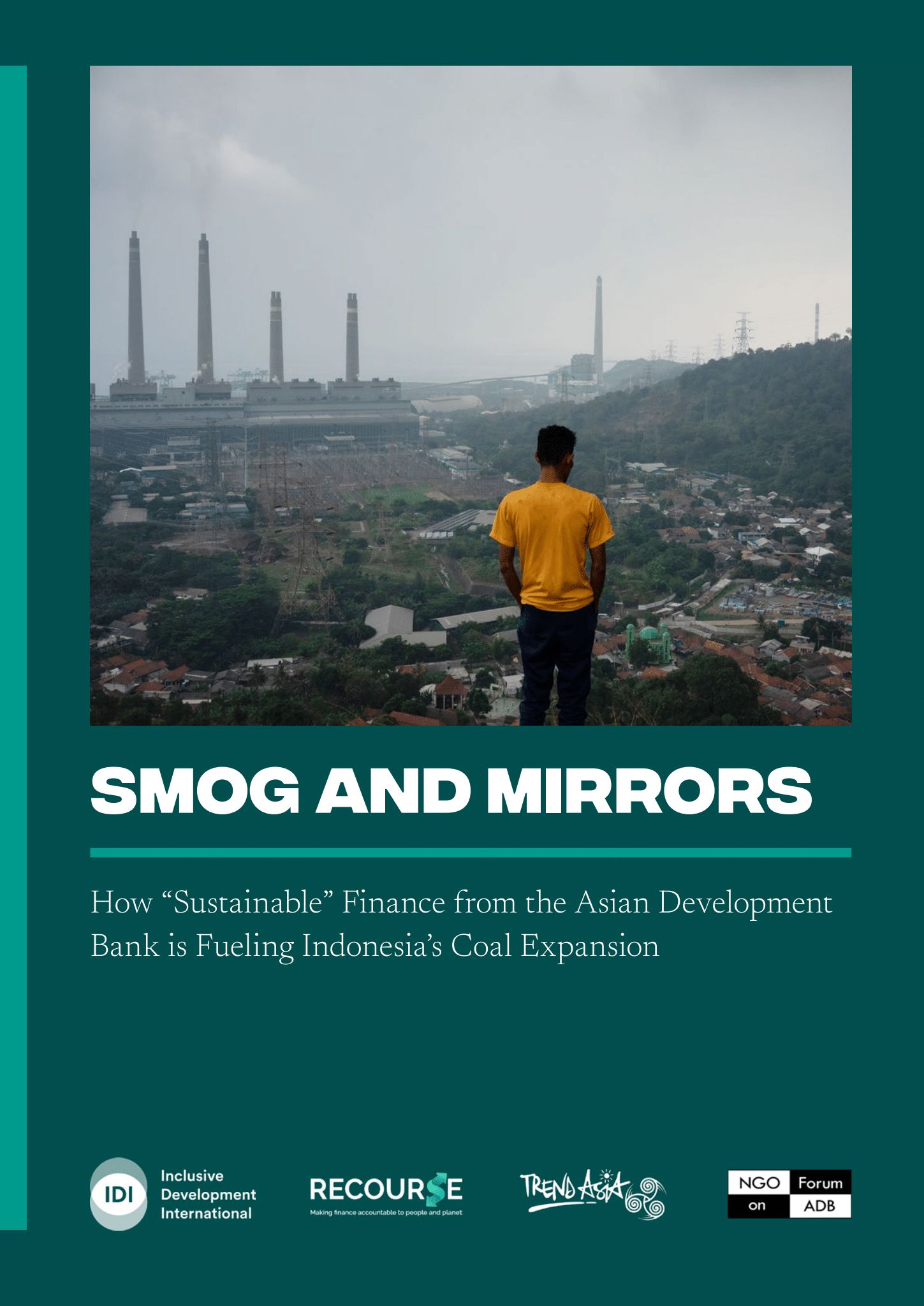Burning fossil fuels is the single largest contributor to greenhouse gas emissions. Keeping them in the ground is the most important thing we can do to prevent further climate change and its disastrous implications for human rights and humanity.
The extraction and burning of fossil fuels can also have direct and devastating impacts on local communities, including many that Inclusive Development International works with, from those in East Africa that have been displaced or are threatened by the planned construction of the East African Crude Oil Pipeline (EACOP), to the many communities that have faced forced eviction and loss of livelihoods, adverse health impacts, and intimidation and violence linked to the construction and operation of coal-fired power plants in the Philippines and Indonesia.
Through our case work, our Follow the Money research support to community organizations, and our involvement in the End Coal Finance campaign with partner organizations, Inclusive Development International works to stop the flow of capital to fossil fuel projects around the world.
End Coal Finance Campaign
Coal-fired power is a significant driver of climate change and has myriad well-known negative effects on human health, particularly among populations living near coal-fired power plants. Recognizing this, many major public and private financial institutions have adopted policies to move away from coal financing. But those that haven’t—and the often-gaping loopholes left by those that have—are enabling continued coal expansion. Commercial banks channeled more than $1.5 trillion into the coal supply chain between January 2019 and November 2021, and global coal production hit an all-time high in 2023. Development finance institutions, which finance coal projects through commercial banks acting as financial intermediaries, also still play a pivotal role.
Not only are public and private financial institutions still funding grid-connected coal power, but a new wave of “captive” coal power plants (which support industrial processes, including the smelting of metals involved in a renewable energy transition and the production of steel) are being built and financed, which threatens to derail decarbonization and decommissioning pathways.
Most new coal development is happening in Asia. Collectively, a total of 27 countries in Asia account for about 76% of current global coal generation capacity.
In solidarity with coal-affected communities, including those we have worked closely with in the Philippines and Indonesia, Inclusive Development International has joined with our international partners Recourse and BankTrack, as well as regional partners Trend Asia, the Philippine Movement for Climate Justice, WALHI, Center for Financial Accountability and others in a campaign to cut off public and private financing for new coal projects in the region.
Our targets include commercial banks and development finance institutions—including the Asian Development Bank and the International Finance Corporation (IFC)—that continue to back new coal projects throughout Asia and that have yet to effectively align their policies and practices with the goals of the Paris Agreement on Climate Change. We are campaigning to ensure these institutions close all remaining loopholes that allow support for coal, whether directly or via financial intermediaries.
As part of our collaboration with partners on this campaign, Inclusive Development International is conducting Follow the Money research to uncover the key financiers behind new coal projects in Asia. We have published our research to-date in a public online database, along with two exposés based on on-the-ground reporting in Southeast Asia revealing in detail how the IFC and ADB are linked to new coal development in the region.


Tracing World Bank Group investments to coal in Asia
This work builds on our prior investigations into the International Finance Corporation’s financial intermediary lending, which revealed the IFC’s ties to nearly 150 harmful development projects round the world, including numerous coal mines and power plants throughout Asia. In 2017, we worked with the Philippine Movement for Climate Justice to file a historic complaint to the Compliance Advisor Ombudsman against IFC for fueling global warming, environmental contamination and other adverse impacts on communities’ health and livelihoods through its indirect investments in 19 coal plants across the Philippines.
Since then, the IFC has made a series of commitments designed to reform its approach to investing in financial institutions, reduce its exposure to coal and align itself with the Paris Agreement. Most prominently, in 2019 the IFC launched its Green Equity Approach, which requires financial institutions in which it holds shares to halve their coal exposure by 2025 and eliminate it from their portfolios by the end of the decade. And the Joint MDB Principles for Paris alignment, published in June 2023, committed to excluding investments in the extraction of, and energy generation from, coal and peat from all future operations for the World Bank and most other multilateral development banks (MDBs).
Also in 2023, the IFC closed a major loophole in the Green Equity Approach by restricting equity clients from financing any new coal projects. This followed civil society outrage about the fact that IFC’s first Green Equity client, Hana Bank Indonesia, had financed the new Java 9 & 10 coal plants at Indonesia’s Suralaya Power Station. That financing was the subject of another complaint to the Compliance Advisor Ombudsman submitted by Inclusive Development International, PENA Masyarakat, Recourse and Trend Asia on behalf of affected communities.
However, loopholes remain: the IFC’s Green Equity Approach and the Joint MDB Principles still allow financial intermediary clients to underwrite bonds for coal developers, and still allow clients to finance “captive” coal plants to power industrial projects. It is also unclear how and whether the “no new coal” rule is being applied to existing clients’ corporate financing of coal developers. In fact, our research shows that banks in which the IFC holds equity stakes have continued to provide significant financing to developers of new coal projects.
In our report, “Blowing Smoke: How Coal Finance is Flowing through the IFC’s Paris Alignment Loopholes,” published with Recourse and Trend Asia in October 2023, we illustrate how the IFC is still backing new coal capacity through its investments in banks and other financial institutions despite its commitments to align those investments with the Paris Agreement.
For the report, we traced the International Finance Corporation’s money through financial intermediaries to new coal‑fired power capacity in Asia.
We found that the IFC is exposed to 68.3 gigawatts (GW) of coal-fired power capacity, nearly double the coal-fired capacity of Germany, either in the form of newly operational plants that have come online since 2019, projects that are currently planned, or plants that are under construction. This coal capacity is spread across 39 projects in China, Indonesia and Cambodia. Our public database of IFC links to new coal development in Asia can be accessed here.
Our recommendations to the IFC are:
Revealing the Asian Development Bank’s support for new coal
Inclusive Development International research has revealed that the Asian Development Bank is also quietly backing new coal power development in Indonesia, despite having pledged to become a leader in the fight against climate change.
Our recent report, Smog and Mirrors: How “Sustainable” Finance from the Asian Development Bank is Fueling Indonesia’s Coal Expansion, reveals how the bank’s $600 million loan to Indonesia’s state-run electricity utility, framed as an effort to “promote the use of clean energy,” is backing dozens of planned coal plants in the country. These include the Java 9 & 10 expansion of the notorious Suralaya Power Station, Southeast Asia’s largest coal plant and the dirtiest industrial complex in the region. Pollution from the facility and other nearby coal plants kills an estimated 2,500 Indonesians per year and causes numerous health problems, including respiratory disease and cancer.
By backing the Indonesian government’s coal expansion plans, the bank appears to be violating a no-new-coal commitment in its updated Energy Policy from October 2021, released two months before it signed the loan. The loan also seriously undermines the bank’s renewable energy agenda and continues a pattern of past support for fossil fuels in the region.
Because the loan is cloaked in the language of environmental sustainability, it has until now escaped public scrutiny. Inclusive Development International discovered the loan as part of our broader research into coal finance in the region.
Campaign to Stop the East African Crude Oil Pipeline
Inclusive Development International is working with a coalition of local, regional and international organizations to stop the construction of a massive oil pipeline running through the heart of East Africa, and the associated oil drilling projects, that would affect tens of thousands of people, endanger the critical ecosystems of the Lake Victoria basin area and tip the world closer to a climate catastrophe. Our focus has been on stopping the flow of money to the project and dissuading insurance companies from providing the coverage that project developers need to move forward. Read more about this work on our StopEACOP campaign page.
Hey, you seem interested in our work. Why not sign up to our mailing list for occasional updates, alerts and actions?